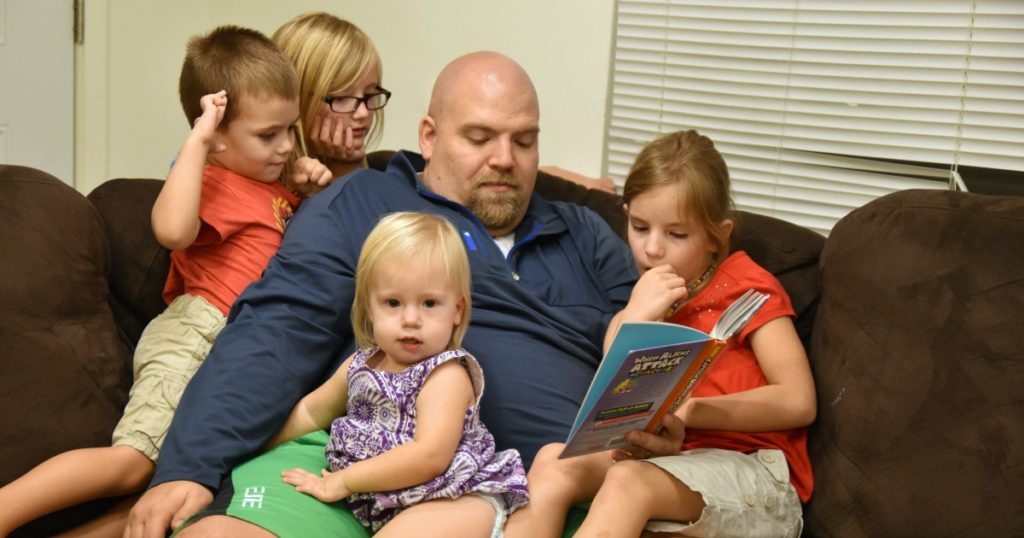Inside: Discover five reasons why parent involvement is important, and 4 parent involvement ideas to better be involved in your child’s life.

Modern parents have become more involved in their child’s development.
An increasing number of fathers, for example, decided to take a backseat to their own careers and be their child’s primary carer while their wives are at work instead.
And research shows that parent involvement in schools, and in the home, make a big difference in a child’s achievements.
Parent Involvement Definition
If you aren’t sure what exactly “parent involvement” means, in the academic sense, parent involvement is defined as:
“the participation of parents in every facet of children’s education and development from birth to adulthood, recognizing that parents are the primary influence in children’s lives. Parent involvement takes many forms, including:
- Two-way communication between parents and schools
- Supporting parents as children’s primary educators and integral to their learning
- Encouraging parents to participate in volunteer work
- Sharing responsibility for decision making about children’s education, health, and well-being
- Collaborating with community organizations that reflect schools’ aspirations for all children”
Childhood psychologists believe that active parental involvement has a number of positive impacts on the development of the child.
Early childhood education experts say that parents who participate in both academic and extracurricular activities are more likely to raise happy and successful children.
Below are a few reasons parental involvement is essential in child development.

Why Is Parent Involvement Important
1. Kids will have more self-confidence
While young kids are naturally confident, they will mature to a certain age when they become more aware of themselves and the people around them.

They become vulnerable to external influences like bullying, stereotyping, and criticism ‒ situations that parents do not have control over.
Children who have involved parents typically have a healthy self-esteem. They are not entitled or boastful, but rather assertive when needed.
In addition, parental involvement encourages children to choose the right kind of friends; thus, preventing themselves from getting into trouble.

2. Kids will improve their social skills
The culture of acceptance and respect begins at home.
Children feel good whenever they are complimented for their hard work or kindness. When parents are less involved, children might feel unheard or invisible.
Kids adapt the way their parents interact with them.
They tend to share their successes when they grow up around supportive parents.
They make friends and show happiness for other people’s achievements.

3. Kids will feel more secure
Secure attachment is a crucial phase in child development. In fact, attachment does not stop even until the teenage years.
Children have to feel they are loved and protected, no matter what the circumstances are.
Parents can nurture a sense of security when their child knows they can rely on them for food, shelter, clothing, protection, and other basic needs.
Emotional security is what helps adults foster healthy interpersonal relationships.

4. Kids will have better mental wellness
In this technology-driven society, kids experience a greater disconnect and isolation.
Related: Why Moms Feel So Isolated and What to Do About It
This is damaging to one’s mental health, especially when they struggle to receive emotional and moral support from their families.
With parent involvement, the parent or guardian is sensitive enough to notice changes in the behavior of the child. He or she will step in to intervene and determine the root cause.
Involved parenting allows the parent and the child to establish an emotional connection in difficult times.
Having a teens journal might help your adolescent child vent out, as well as develop other important skills.

5. Kids will improve academically
Students with actively involved parents are more likely to improve their learning skills.
The feelings of security and unconditional love will help children focus on the things they are studying and learning.
They are also not afraid to make mistakes or try new things as they know their parents are there to support them no matter what.

4 Parent Involvement Ideas So You’ll Be More Involved In Your Child’s Life
Below are some simple tips on how you can become a more involved parent in your child’s life:

Have regular family meetings
Regular family meetings allow building a connected, positive family culture.
They can address everything from celebrating accomplishments and distributing chores to facing stressful or serious issues.
Related: The Truth About If Kids Should Be Paid for Doing Chores

Make one on one time
The best gift you can give your child is your time.
Parents are often caught up with the need to make a living while juggling to become effective parents and spouses.
Create a simple weekly tradition (like, journaling together or going to your favorite cafe) to spend some one on one time together.
Related: How to Make a Year of Dates Gift
Provide emotional support
Children need our solid guidance so they can process their emotions in a healthy way. Parents can equip their children with the tools to recognize and manage their emotions.
Eat together
As the adage goes, “A family who eats together, stays together.”
Eating together creates a strong family bond. This is an opportunity for everyone in the family to share stories, problems, and aspirations after a long day outside home.
Related: How to Create a Family Motto
Parental involvement has a huge positive impact on child development, academically, socially, emotionally, and phsyically.
Children whose parents are actively involved in their upbringing grow up to be proactive, secure, and confident individuals.
This was a guest post by Alexandra Eidens is the founder of Big Life Journal, an engaging resource to help kids develop a resilient growth mindset so they can face life’s challenges with confidence.



November Chizurumoke says
I totally agree with you. Parents should get involved in the development of their children.
By doing so, they raise children who are more confident, having a positive self esteem.